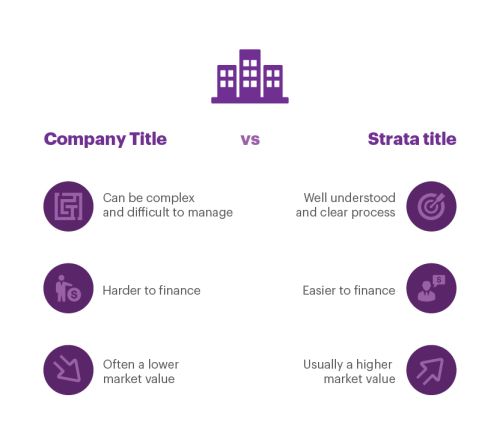Strata title is a familiar concept for most residential property owners. However, prior to the introduction of the first strata title legislation in New South Wales in 1961, company title was the principal form of residential apartment ownership in apartment buildings.
WHAT EXACTLY IS COMPANY TITLE?
Under company title arrangements, a company owns the building. The ownership of particular shares in the company entitles a shareholder to exclusive use and occupation of a particular apartment within the building and use of common areas. Regular levies are usually payable by shareholders and the rights and responsibilities of owners are set out in the constitution of the company that owns the building.
The overlay of corporate law with property rights can make company title arrangements somewhat cumbersome and difficult to manage. This can lead to additional recurrent expenses for owners.
ADVANTAGES OF STRATA TITLE OVER COMPANY TITLE
Converting an existing company title building to strata title can be highly beneficial:
(a) Greater familiarity and clearer processes
On a practical level, owners can find company title apartments
more difficult to sell as many people are unfamiliar with this type
of apartment ownership. Additionally, ongoing management of the
building can sometimes be cumbersome and costly.
In New South Wales, strata title properties are governed by the
Strata Schemes Management Act 2015 (NSW). Similar legislation
exists in other states. The rights and responsibilities of lot
owners, owners' corporations and strata managers are much
clearer under strata title than under company title.
(b) Easier financing
Lenders greatly prefer strata title over company title
arrangements. While most banks will consider an application for
financing against company title their lending process is subject to
more restrictive lending criteria than for strata title. For
example, if a bank is willing to consider lending for the purchase
of a company title apartment it may only be prepared to lend 50-60%
of the value of the apartment (without additional security being
provided).
In contrast, a bank may be very willing to lend 80-90% (or more)
against the value of a strata title apartment. The reason for this
is that a lender will not have (or not perceive that it has) as
good security in the company title apartment (which is in the end
owned by the company and not by the bank's customer).
(c) Higher market value
As a result of the difficulties associated with company title and particularly the more limited financing available, strata title apartments are generally valued at an estimated 10-20% premium over company title apartments. Given residential property values in Australia (and particularly in the Sydney and Melbourne markets) even a 10% difference in value may equate to $100,000 or more. This is significant.
HOW DOES THE CONVERSION PROCESS WORKS?
Converting company title to strata title can appear to be a complicated process, particularly without legal assistance.
Despite this the costs of undertaking a conversion (both legal and surveying costs) are expected to be far outweighed by the material increase in the value of an apartment than can be expected following completion of the strata title conversion.
Normally, each apartment owner would not have to pay any stamp duty as part of the conversion process.
Unlike strata title, not all Real Estate lawyers are familiar with the processes involved in selling, buying, leasing and dealing with issues related to company title. Consequently, any transactions involving company title are generally more onerous for all parties involved and are likely to result in higher legal costs for both the vendor and the purchaser than the normal costs involved in the sale of an otherwise equivalent strata title apartment.
IS CONVERTING TO STRATA TITLE SUITABLE IN ALL CIRCUMSTANCES?
Usually it is suitable and there may be great financial benefits for each apartment owner in doing so. However there may be circumstances in which owners may be advised not to commence the conversion process.

Dentons is the world's first polycentric global law firm. A top 20 firm on the Acritas 2015 Global Elite Brand Index, the Firm is committed to challenging the status quo in delivering consistent and uncompromising quality and value in new and inventive ways. Driven to provide clients a competitive edge, and connected to the communities where its clients want to do business, Dentons knows that understanding local cultures is crucial to successfully completing a deal, resolving a dispute or solving a business challenge. Now the world's largest law firm, Dentons' global team builds agile, tailored solutions to meet the local, national and global needs of private and public clients of any size in more than 125 locations serving 50-plus countries. www.dentons.com.
The content of this article is intended to provide a general guide to the subject matter. Specialist advice should be sought about your specific circumstances.


